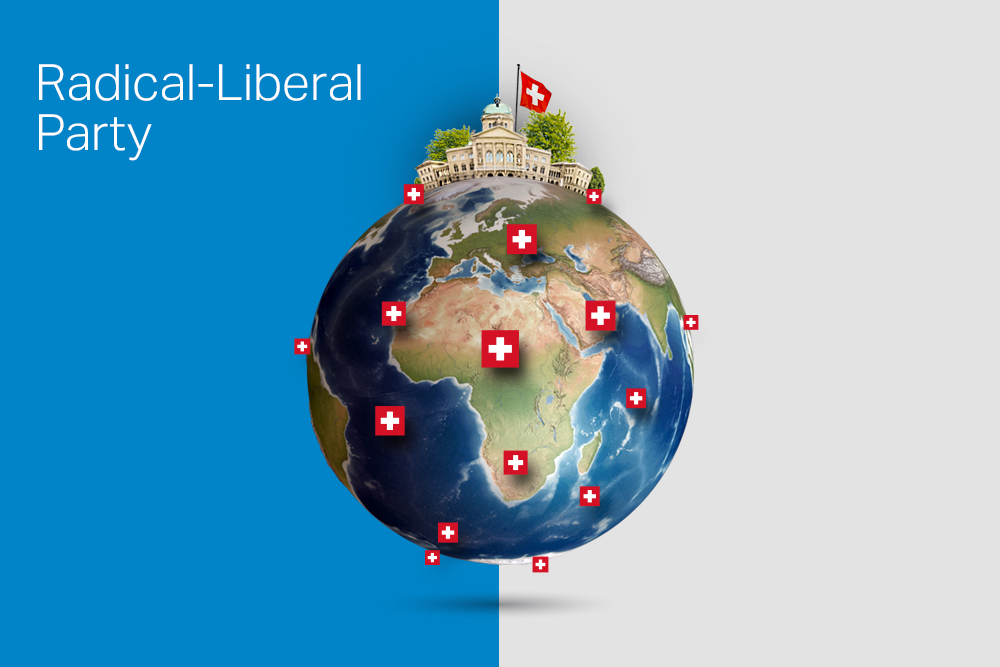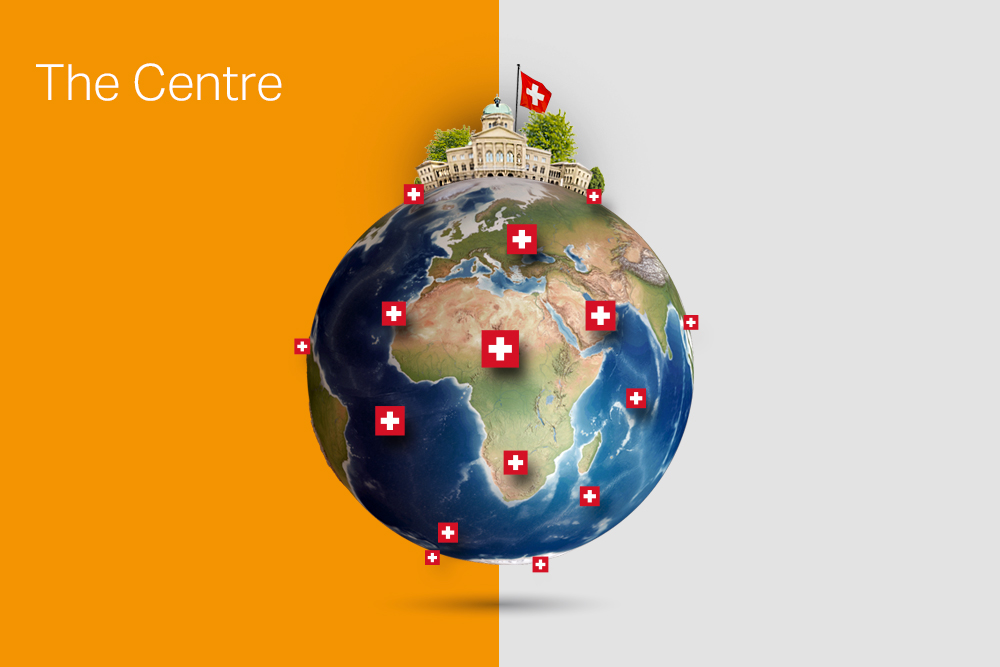Swiss People’s Party International: for an independent Switzerland

The right-wing Swiss People’s Party has had an international branch since 1992. From Swiss sovereignty in Europe to opposing e-voting, branch chair Inge Schütz outlines the vision of her party.
Two events in 1992 led to the founding of People’s Party International. The first was the lifting of all restrictions on Swiss having double citizenship, and the other was the referendum “no” vote to Switzerland joining the European Economic Area (EEA).
“When you think how many Swiss go abroad now and how globalised the world is, it makes more and more sense to have an international branch,” says Inge Schütz, chair of People’s Party International.
The international branchExternal link of the party has the same rights and duties as a cantonal branch of the party. About 370 Swiss Abroad belong to it.
- Swiss People’s Party
- Founded: 1918 (as the “Farmers’, Tradesmen’s and Citizens’ Party”” in canton Bern)
- Ancestor parties: “Farmers’, Tradesmen’s and Citizens’ Party” and “Democratic Party” (Glarus and Graubünden)
- Founding year: 1971, after a merger of the above two parties
- Presidency: Ticino senator Marco Chiesa (since 2020)
- Federal Council (government) posts: 2, Guy Parmelin (since 2016) and Albert Rösti (since 2023)
- Membership: 90,000 (as of 2015)
- Proportion of seats in the Federal Assembly:
- 53 seats held in House of Representatives (27% of total seats, not including two seats belonging to the Federal Democratic Union and the Lega dei Ticinesi, which form a voting block with the party)
- 7 seats in the Senate (15% of total seats; not including the independent Thomas Minder)
- Proportion of women in the House of Representatives: 25%
- Proportion of women in the Senate: 14%
- Political position – three core issues:
- Cut down on immigration by means of a restrictive policy on immigrants and refugees
- Defend the principle of neutrality, no further political integration into Europe
- No further expansion of social programmes; restrictive taxation and financial policy. (SRF)
A sovereign Switzerland
The party has no particular goals for the Swiss Abroad, “as our main issues are international anyway”, says Schütz. In general the party “advocates an independent Switzerland”.
This sovereignty must determine relations between Switzerland and the European Union, she says. Although she approves of the bilateral accords in place, “because they make life easier for hundreds of thousands of Swiss living in the EU”, Schütz warns “but only as long as this country remains sovereign and can make its own decisions”.

For direct democracy
Originally from Lucerne, Schütz lived in Sweden for 16 years. “I never thought I would come back,” she says. She believes Swiss should retain their voting rights no matter how long they live abroad. Life circumstances may always change.
She also believes that Swiss citizenship should not be inherited just for a restricted number of generations. “We have a right of blood system. For direct democracy it is important that that remain so.”
A period of time spent abroad affords the opportunity to compare political systems, she says. “You see then what power direct democracy actually gives us.” Although Schütz cautions that “voting is a voluntary act and there is no compulsion”.
Opposed to e-voting
As a former Swiss Abroad, Schütz knows of the frustration of wanting to participate in national votes and the voting papers come late or not at all.
Some years ago, the party’s international branch put forward a motion in parliamentExternal link to send voting papers out by email. Parliament didn’t adopt it.
E-voting arouses scepticism in the party, she says. “The principle is good, but we have seen that the system can be hacked. So we’re opposing it.”
No representation wanted
Direct representation for Swiss Abroad in the form of seats in parliament, as already happens in France and Italy, is not favoured by the party, Schütz says. “Many issues are on a cantonal or local level. There is no point in expecting to handle them all at the federal level.” She would find it better for the interests of Swiss Abroad to be represented by local party representatives.
In the upcoming elections in October the party will be making use of international electoral lists. Several cantonal party branches have indicated their willingness to set up these kinds of lists, such as Lucerne, Zug and Graubünden – the list is not complete.
The banking problem
The banking problem is a major issue for Swiss Abroad. Yet Schütz asks why private business should be forced to do anything. To require Swiss banks to provide the same services to Swiss Abroad as to residents would mean little short of nationalising the banking system, she claims.
“Every business must be able to position itself so that it has enough customers,” she says, adding that the federal government should not be supporting media outlets which are oriented towards Swiss Abroad. Networks like Swiss schools abroad or swissnex should also be self-supporting.
Social insurance issues
The party does not support the idea of voluntary participation by Swiss Abroad in the Swiss health insurance system. It would be unrealistic to aim at a uniform worldwide solution, “because jurisdictions work very differently,” Schütz maintains. “A system like that would be uncontrollable and it would cost Switzerland a fortune.”
Swiss Abroad returning to Switzerland have the same rights as residents, notably rights to claim social welfare, regardless of their language ability or connection with Switzerland. Schütz sees no reason for this to change. “No one can be discriminated against. Foreigners have the same rights.”
+ The climate change coup in 2021: in 2021 the People’s Party was the only major party to oppose the government’s legislation to deal with CO2 and won. The People’s Party was unable to repeat this success with the climate change legislation in 2023.
+ Close to the trending issues: the People’s Party has shown its ability to identify potential issues and magnify them. Their campaign against “gender and wokeness” has given them a topic that seems to bother plenty of people, according to opinion polls.
+ More senators: Senate elections, which mostly use the first-past-the-post system, have always been a tough nut to crack for the People’s Party. Esther Friedli turned the corner in 2023 with her election to the Senate. A promising start for the autumn 2023 campaign. (SRF)
– Pandemic opposition: the People’s Party opposed the Covid policy adopted by the federal government, calling it dictatorship. But when it came to a vote (referendums on the Covid legislation) the party lost three times at the ballot-box.
– People’s Party versus cities: the campaign against the “leftwing and Green cities” did not catch on at all. Party president Chiesa sounded particularly unconvincing as he launched this idea.
– The voters want free movement of people: the People’s Party lost soundly in 2020 with its initiative to curb immigration – its key issue. (SRF)
Election issues and goals
Immigration: The People’s Party is using its “sustainability initiative” to attack the free movement of people accords with the EU for the third time.
Refugees: The People’s Party wants a tough new refugee policy. For example, it wants to move asylum applications outside the country.
“Woke and gender”: The party aims to appeal to voters who have their backs up about “wokeness” and gender debates.
Neutrality: The People’s Party is the only major party opposing easier transfer of weapons to Ukraine and sanctions against Russia. (SRF)
Starting position and prognosis
Four years ago things looked bad for the People’s Party. Especially in terms of the issues that were front and centre with the electorate. Then it was climate change and women’s issues, which were no help to the party. In the general elections the trend favoured the left and the Greens, not the People’s Party. This trend continued in elections at the cantonal level. In the meantime the populist party has turned things around and seems to be bouncing back.
This year the main issues are more the ones that appeal to the People’s Party: Ukraine and neutrality, immigration and refugees. Recent cantonal elections and national opinion surveys have been buoying the party. As its goal this time around, the People’s Party aims to win over 100,000 new voters. That would make up for the losses of 2019. This is an ambitious goal, but not an unrealistic one. (Dominik Meier, SRF)
Edited by Samuel Jaberg. Translated from German by Terence MacNamee/ts

In compliance with the JTI standards
More: SWI swissinfo.ch certified by the Journalism Trust Initiative














You can find an overview of ongoing debates with our journalists here . Please join us!
If you want to start a conversation about a topic raised in this article or want to report factual errors, email us at english@swissinfo.ch.